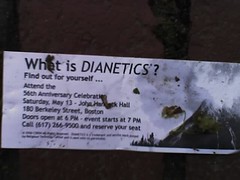When
Narconon school lectures came under the scrutiny of the Californian State Department, a point was made that is quite far reaching. They stated that, along with a lot of misinformation about drugs, the curriculum spoke of the incredible results Narconon alleges its controversial
Purification Rundown gets. This, it was argued, was not a good message to impart to children to dissuade them from ever trying drugs. Put simply, if it is easy to become drug free, then there is less of a barrier to trying drugs. If someone gets hooked, they can always do the rundown, so why not do drugs?
The other dimension to that, of course, is that if you suggest that it's not possible to get off drugs, then people who are already on drugs will simply not try. The challenge of drugs control is to warn off non-users while at the same time offering hope to addicts.
Listening to a recording of
Frank Swain's talk at Westminster Skeptic, I was struck that the same sort of problem exists with skepticism. Swain believes that the Skeptic movement, of which he counts himself a member, is beset by aggression and an unwillingness to properly engage; a situation that is making it largely impotent. Whereas Swain's view of the skeptic movement is somewhat contested as a reality, it is certainly the view many people have of the movement, and it is a view that is growing. Michael Marsh made the point on Twitter that, for instance, the
10:23 campaign alerted many people who otherwise would not have known that homeopathic remedies do not contain any physical ingredient. You can add to that Singh's spat with the BCA, which did much to publicise the fact that chiropractic was not, as many thought, conventional medicine.
Such publicity may do much to inoculate those uninvested, but it genuinely does little to those who have already mucked in with the ideas under scrutiny. Those in the movement are probably already aware of the arguments made against, for instance, the use of Randomised Double Blind
Placebo Controlled Trials for
homeopathy, say. These kind of arguments are borne out of a need to explain away negative results. If the science negates the outcome, then science must be at fault because "I know I'm right!". People who are of this mindset are hard enough to reach at the best of times, but the sight of a group of people en masse swigging down homeopathic remedies (incorrectly!), is certainly not going to convince them that they at least need to revisit their thinking.
I think that's the real problem with the Skeptic movement - that it is focused too much on prevention and not enough on cure. It is easy to think up stunts that show up ridiculous ideas; it is easy to use existing legislation to ensure that practitioners stick to the rules with regards trading and advertising. It's much harder to take a homeopathy user and make them change their mind. It's easier to dismiss a treatment for being no better than placebo, much harder to argue that placebo-only treatment is a bad thing when no other treatment is available. It is easy and maybe even fun to watch a Scientologist run for cover when you call out "Xenu" but having them run into an org, when you really would prefer them to run out of one is clearly a result made of fail.
If these ideas are ridiculous, then the ridicule will speak for itself, and that should be enough to inoculate - the truth, just like in drug abuse prevention, is clearly the way forward. We can be honest about what the ideas are without sticking our tongues out, which ought to leave us with enough bridges left to engage with those who hold to them.
 Image by mandiberg via Flickr
Image by mandiberg via Flickr



